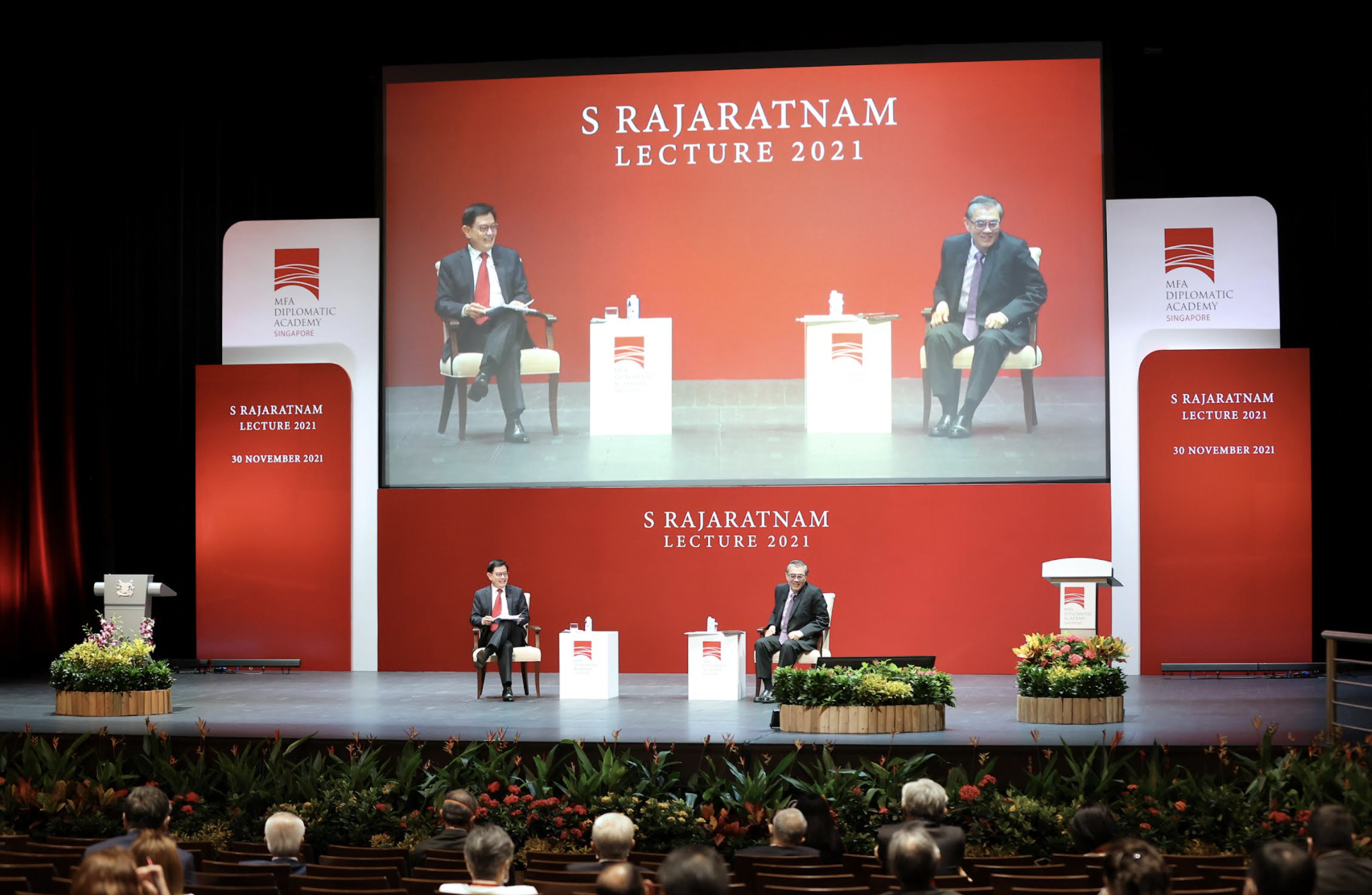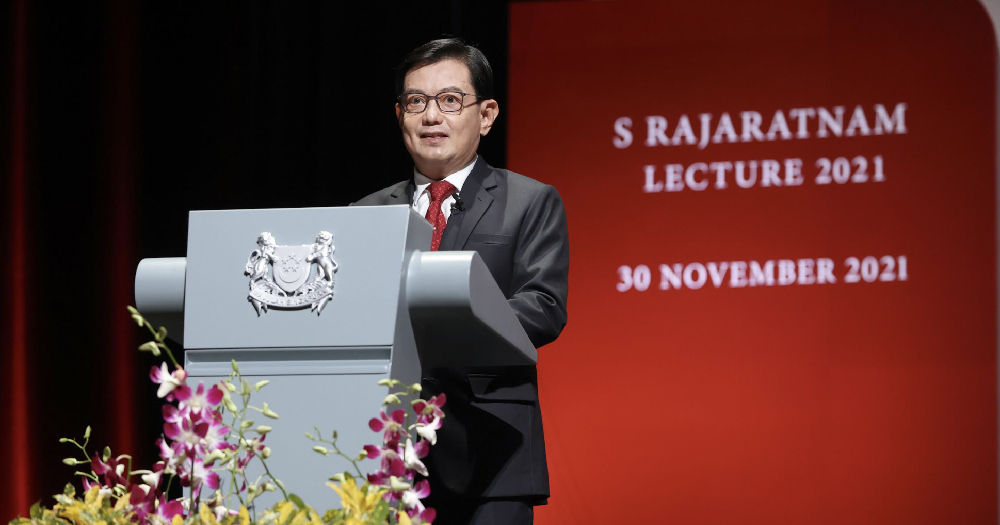Follow us on Telegram for the latest updates: https://t.me/mothershipsg
The United States and China will compete "where they must", but it is critical that safeguards are in place to "ensure that competition does not veer off course into conflict", Deputy Prime Minister Heng Swee Keat said on Tuesday, Nov. 30.
Crucial for U.S. and China to come to "a new equilibrium"
Speaking at the 12th S Rajaratnam Lecture organised by the Ministry of Foreign Affairs (MFA) -- an event where distinguished speakers from Singapore talk about issues related to diplomacy -- Heng said it is "imperative" that the two powers come to "a new equilibrium".
 Image via Ministry of Foreign Affairs
Image via Ministry of Foreign Affairs
This is because given that the two countries are competing within the same inter-connected and interdependent economic system, the cost of decoupling will be "very high", which will lead to "mutually assured economic value destruction".
"At worst, economic decoupling is a slippery slope towards strategic miscalculation and a disastrous conflict," he said.
And time is needed to achieve this "new equilibrium", he added, saying that differences cannot be bridged overnight.
In addition, any clash between the world's two largest economies will only be "to the detriment of themselves and the world", he said.
Such strategic competition and deteriorating relations between both countries have added to the "fragility of peace and prosperity", and it is also "worrying" that voices of restraint, which are "traditional stabilisers of the relationship", have diminished, Heng elaborated further.
Safeguards have to be in place to prevent "miscalculation"
In a question and answer session after his speech, Heng further elaborated on his views regarding U.S.-China relations.
Citing the book "Destined for War" written by American political scientist Graham Allison, who visited Singapore about "two and a half years ago", Heng said war is not inevitable between a rising power and the incumbent power, whose position is being threatened.
While 12 out of 16 cases studied ended up in conflict and bloodshed, four cases escaped such a scenario -- known as the Thucydides Trap, a term popularised by Allison.
Saying that conflicts break out at times due to miscalculations, he stressed that it is important for "safeguards" to be put in place to ensure that such accidents don't happen, and that war is avoided.
Heng added that the Chinese have made their "red lines" clear, including the issue of Taiwan, and that they said they would pursue "peaceful reunification", while Biden has also reassured China that the U.S. adheres to the "one China policy".
While these are "good signs" that the two powers are managing tensions and actively avoiding confrontation, Heng said such policy direction has to be backed by "concrete action".
For instance, he opined that it was "quite provocative" to print a passport with the term "Taiwan" on the cover.
"In the case of China, Chinese fighter jets have been testing the air (defence) identification zone over Taiwan," he said, adding that the U.S. and Taiwan have stepped up diplomatic and military exchanges as well, which China had protested in response.
Common ground for cooperation "not an impossible task"
Nevertheless, even with strategic competition, the U.S. and China should not let it overshadow opportunities for mutual progress, Heng said in his speech.
"Alongside competition, it is crucial that they also cooperate where necessary," he added, adding that there are "many areas of complementarity in economic development between the two largest economies which are at different stages of development".
Heng also cited examples which show that this is not an impossible task.
Both countries have recognised the need to work together on issues of global concern, and have shown this through the joint declaration on climate change they issued at the recent COP26 that took place in Glasgow, he said.
He added that high-level exchanges, such as the recent dialogue between Chinese President Xi and U.S. President Joe Biden, are "welcome signs that both countries want to manage competition responsibly", and put necessary steps in place to make sure their relationship stays on "a stable footing".
Heng further said that even though the future is "complex and uncertain", the opportunity remains to "build a future for a better world".
"By working together to exercise global leadership to tackle shared challenges, and tapping on their vast resources of talent, capital and innovation, they can lead the charge on international progress and development.
This will enable the world to better address the climate crisis and realise the UN Sustainable Development Goals by 2030."
What can Singapore do?
Turning the focus to Singapore, Heng offered three ways that the country can contribute towards the restoration of global growth and stability.
1. Be a "pathfinder" that creates "building blocks" with like-minded partners
As a small state which feels the constraints and pressures of global challenges more than others, Singapore must continue to strengthen a rules-based multilateral system so that all countries, both big and small, will "have their voices heard and their sovereignty respected", Heng said.
While countries may not be able to shape the course of global action individually, they can have agency by working collectively, creating "new building blocks for meaningful change", he explained.
For instance, Singapore has made an impact in global trade through its efforts to establish trade agreements with other like-minded partners, and these efforts eventually resulted in the Comprehensive and Progressive Agreement for Trans-Pacific Partnership (CPTPP) -- a major trade pact that involved several large economies.
Signalling the desire for greater economic integration and the further liberalisation of trade and investment on a global scale, the CPTPP also pioneered commitment to higher standards in areas like e-commerce and intellectual property rights, Heng said.
He added that it is "noteworthy" that China has recently indicated its wishes to join multilateral agreements like CPTPP and DEPA (Digital Economy Partnership Agreement), as with more economies coming on board, they can help to "catalyse momentum for consensus on the way forward".
This is important as no country can recover from this crisis by itself, he stressed.
"The purpose is not to form an exclusive bloc to compete with other groups or powers, but to be pathfinders for global change."
2. Continue to work with our neighbours to realise the region's potential
Despite Asean coming a long way from "an economic backwater" to a "fast-growing region", member states continue to feel the pulls and strains of major power competition in the region, Heng said.
It is still a "battleground of big power conflicts" today, he added, even after several decades have passed since S Rajaratnam -- one of Singapore's pioneer leaders for whom the lecture was named -- first said this at the United Nations in 1965.
To manage this risk, and to enable Asean to remain stable and prosperous, must "remain open, inclusive, and outward-looking" to the U.S. and China, as well as any country that would like to work with us, Heng said.
He further elaborated on the importance of U.S.' security presence in the region, which has brought "stability and peace" in the region over the past decades.
"While the U.S. has revived the Quad and stepped up security cooperation through AUKUS, it is just as, if not more, important for the U.S. to be economically engaged. If not through the CPTPP, then it must have an equally substantial alternative," he said.
The CPTPP was originally derived from the Trans-Pacific Partnership (TPP), which was signed in 2016. Former U.S. President Donald Trump later withdrew the U.S. from the agreement when he took office in 2017.
Previously, Foreign Minister Vivian Balakrishnan revealed that the U.S. "would not proceed" with the trade deal, following the lack of "appetite domestically to proceed with the TPP.
Heng also highlighted the importance of China's economic success to the region, saying it has boosted Asean's growth.
He added that besides China's Belt and Road Initiative, which is an "important effort for greater economic integration and mutual gains", there are many other areas of cooperation that both Asean and China can pursue.
In addition, Heng reiterated that it is not just the U.S. and China that Asean is close to, citing the examples of Japan and South Korea, which have been "major investors" in Southeast Asia.
"Asean must work with any country that wants to work with us, where it is in our interests to do so," he said, adding that to welcome more global investments to the region, it is important for the regional group to maintain its credibility.
He added that Singapore can do its part by keeping Asean open and inclusive, and by continuing to play a key intermediating role in financing the needs of Asean enterprises as a global financial centre.
3. Continue to keep our economy open and prepare Singaporeans to thrive in a global world
Expanding on his third point, which is to make globalisation work at home, he said there needs to be broad-based support domestically in order for a country to maintain any political and economic consensus struck abroad.
To achieve this, locals must feel that ultimately, with globalisation, their lives have improved, he added.
However, he acknowledged that support for globalisation has waned in recent years, due to the benefits of the global economy not being well distributed within and across countries.
Singapore, he said, has reaped the benefits of globalisation.
"Trade is three times our GDP. Our openness has led to improved salaries, more job opportunities and a more vibrant economy.
Many of you might be familiar with the names such as Secretlab, Old Chang Kee, TWG, Prima Taste. These are our homegrown brands that have thrived and gained popularity on the world stage – not least due to globalisation and greater economic integration."
However, he cautioned that Singaporeans should not turn inward even if there is increasing concerns about competition from abroad and disruption to their livelihoods.
He said, "To continue to improve the lives of our people, the only way is to remain useful and relevant to the world. We must therefore continue to transform our companies and upskill our workers."
He further said that a globalised world is "not just what Singapore needs to survive and thrive" but it also "reflects what we stand for as a society".
"As a small nation, we knew since independence that we had to stay open to the world, welcome talent from abroad, and integrate those who choose to assimilate and become one of us."
Quoting the late foreign minister S Rajaratnam again, Heng said that "being a Singaporean is not a matter of ancestry, it is conviction and choice", and cited the examples of Singapore's first three Deputy Prime Ministers who were born outside of Singapore -- Toh Chin Chye in Perak, Goh Keng Swee in Malacca, and S Rajaratnam in what is now Sri Lanka.
S Rajaratnam Lecture in 2019:
Follow and listen to our podcast here
Top image via Ministry of Foreign Affairs
If you like what you read, follow us on Facebook, Instagram, Twitter and Telegram to get the latest updates.
